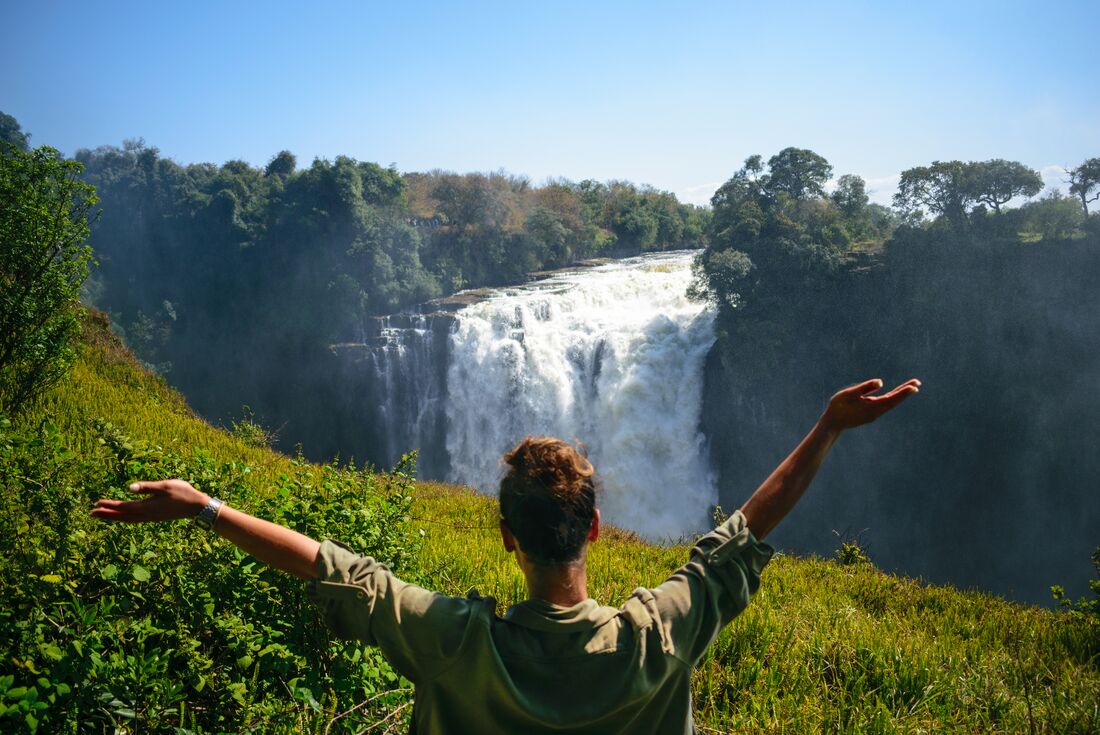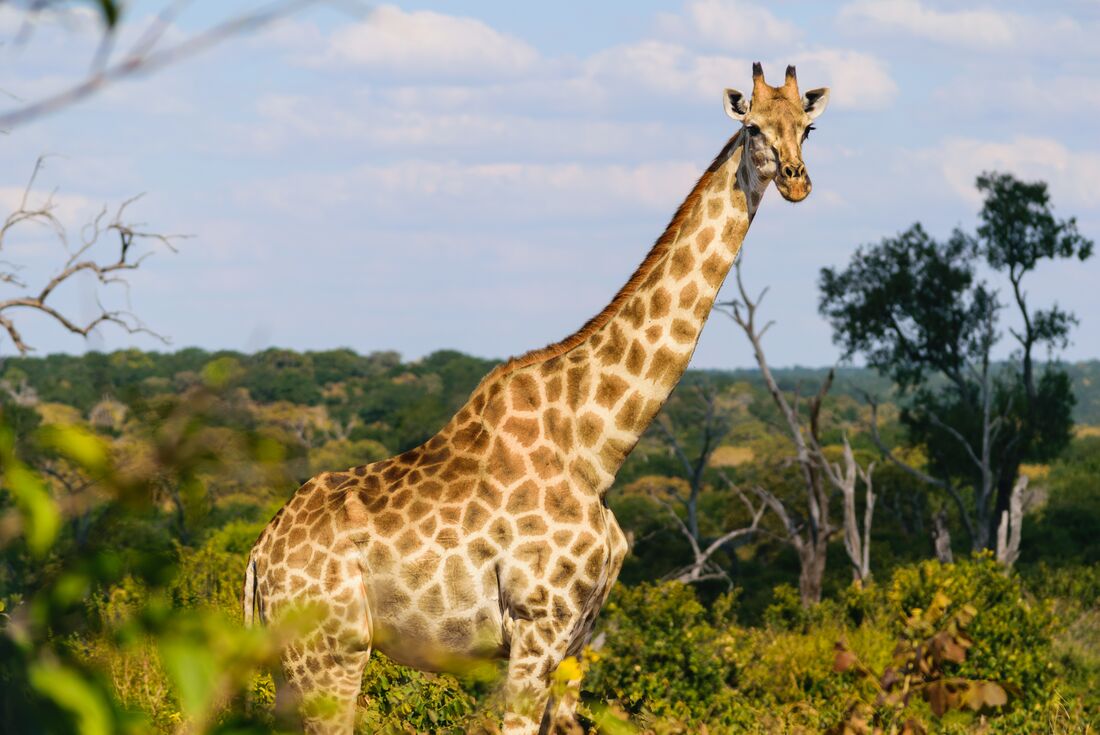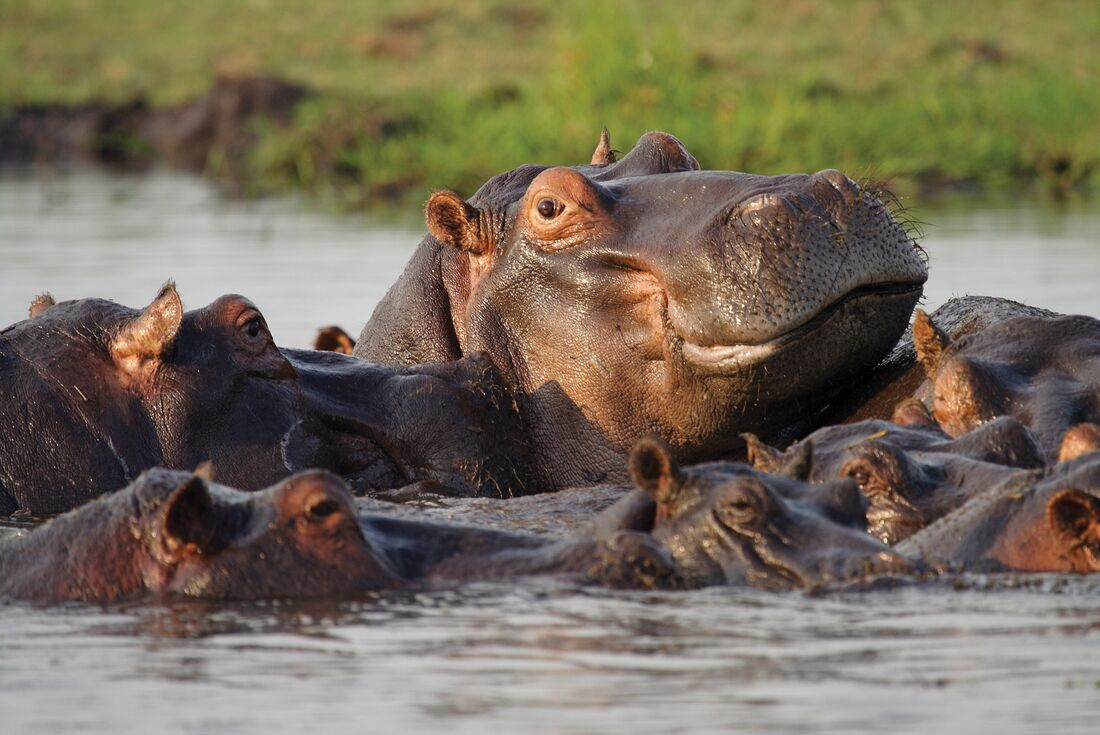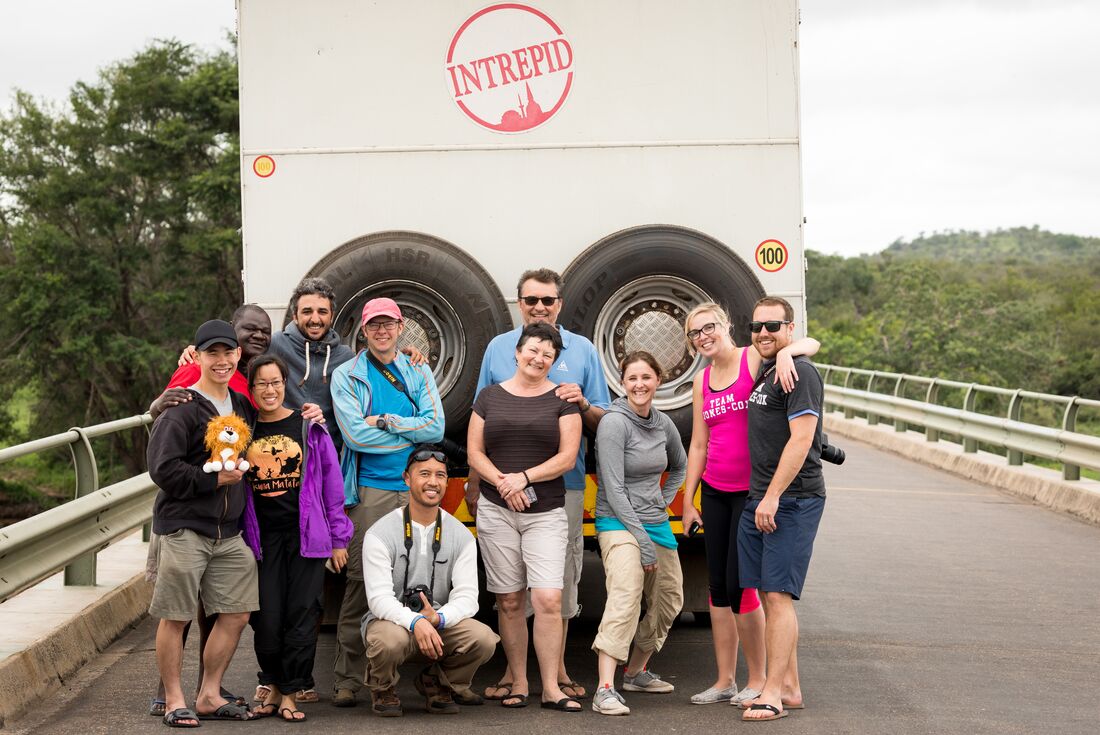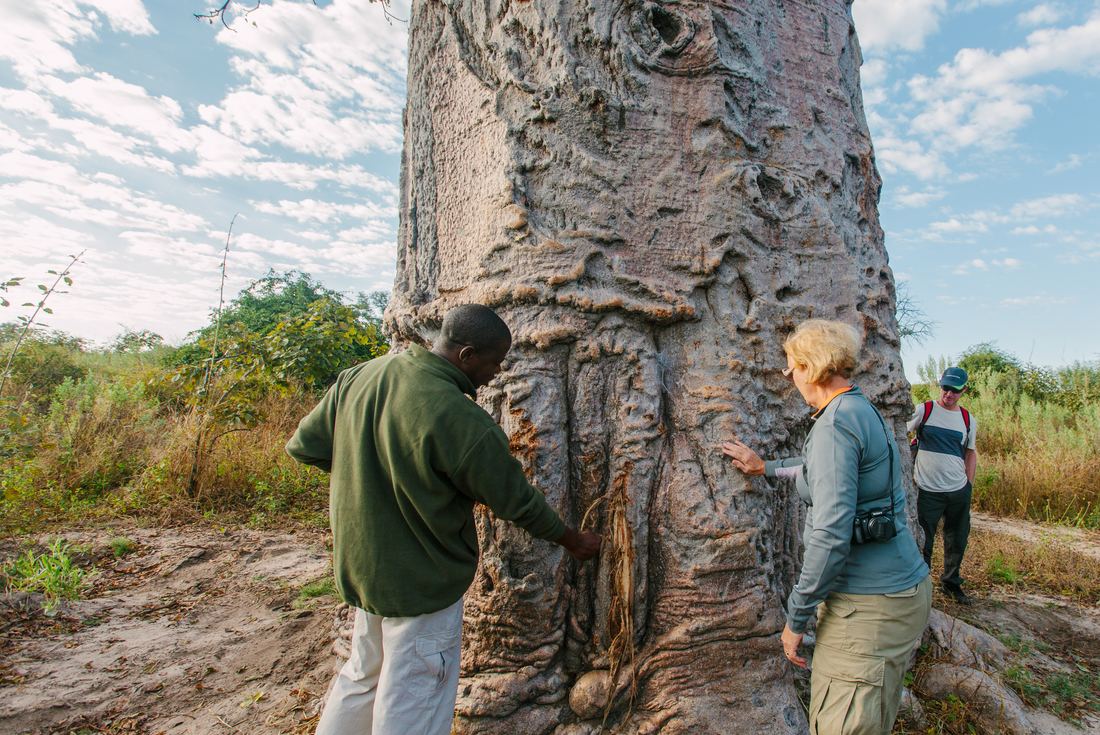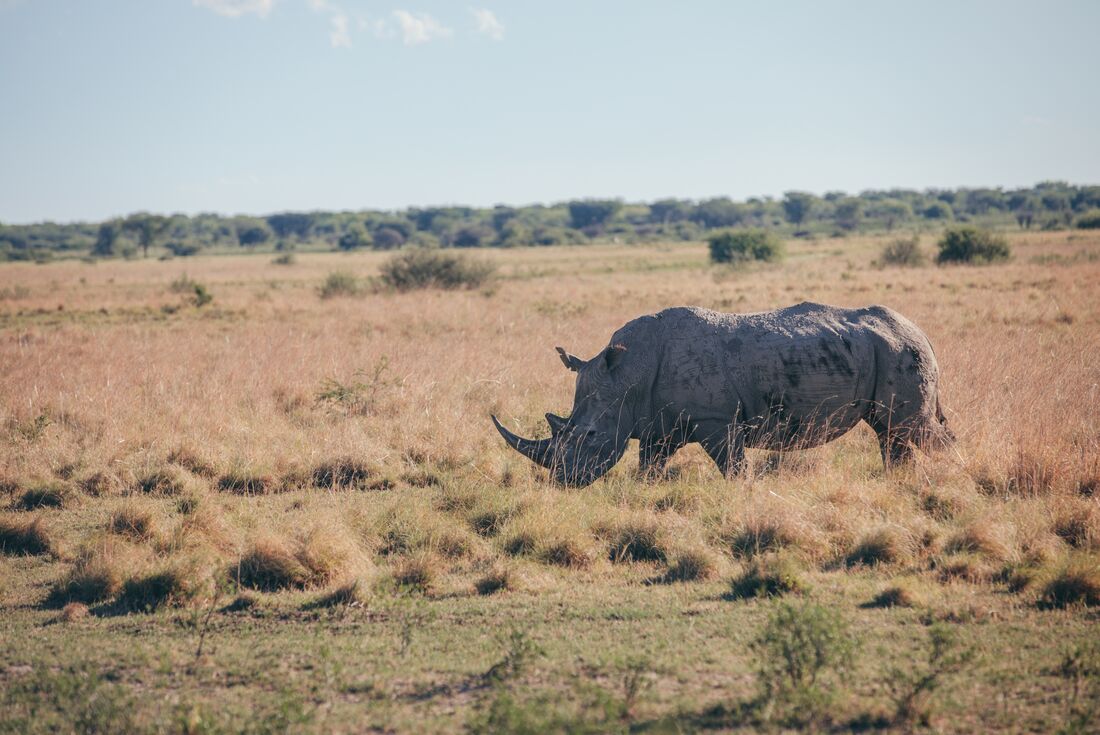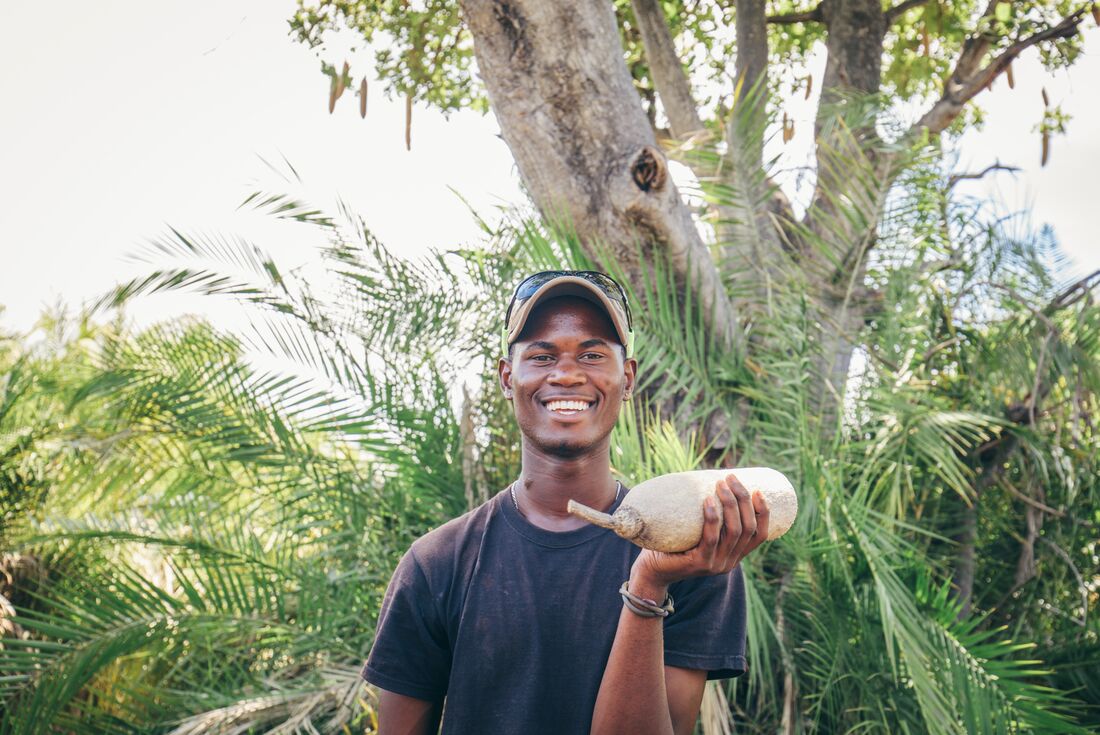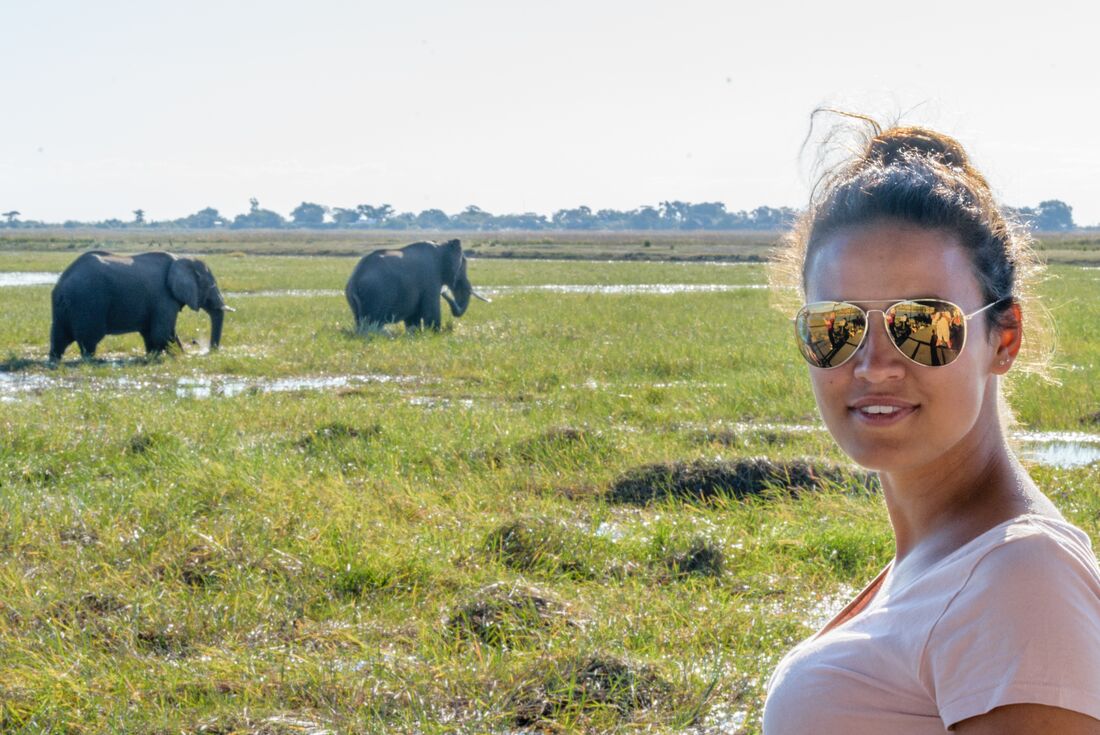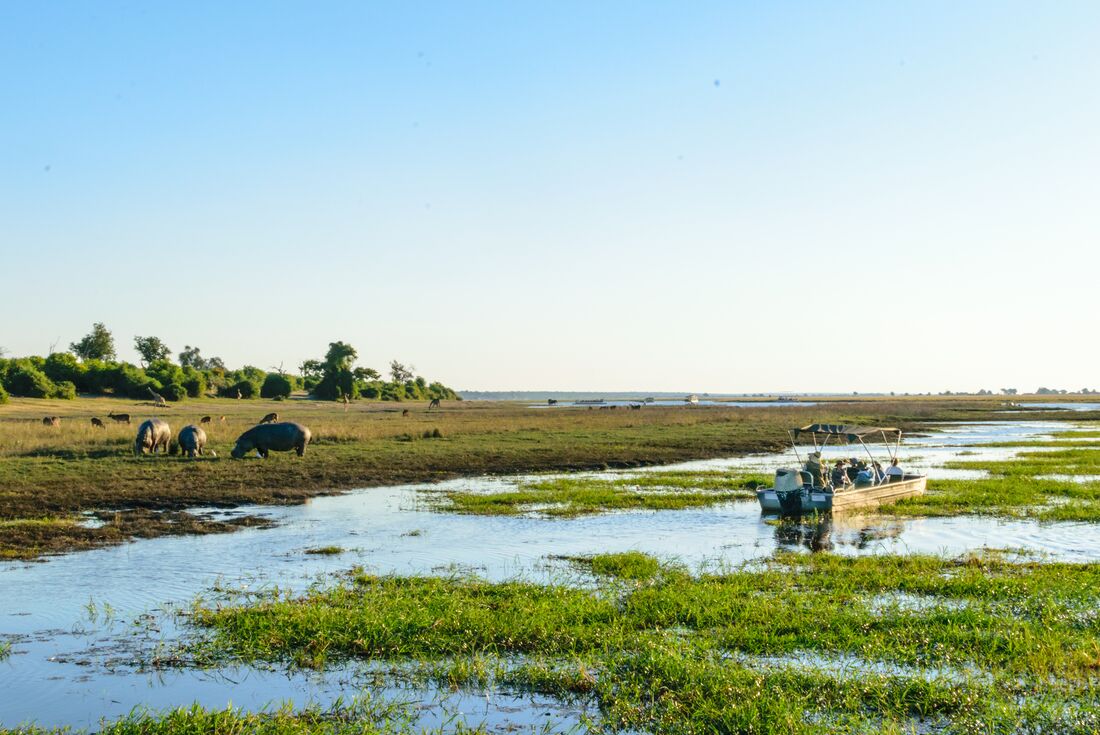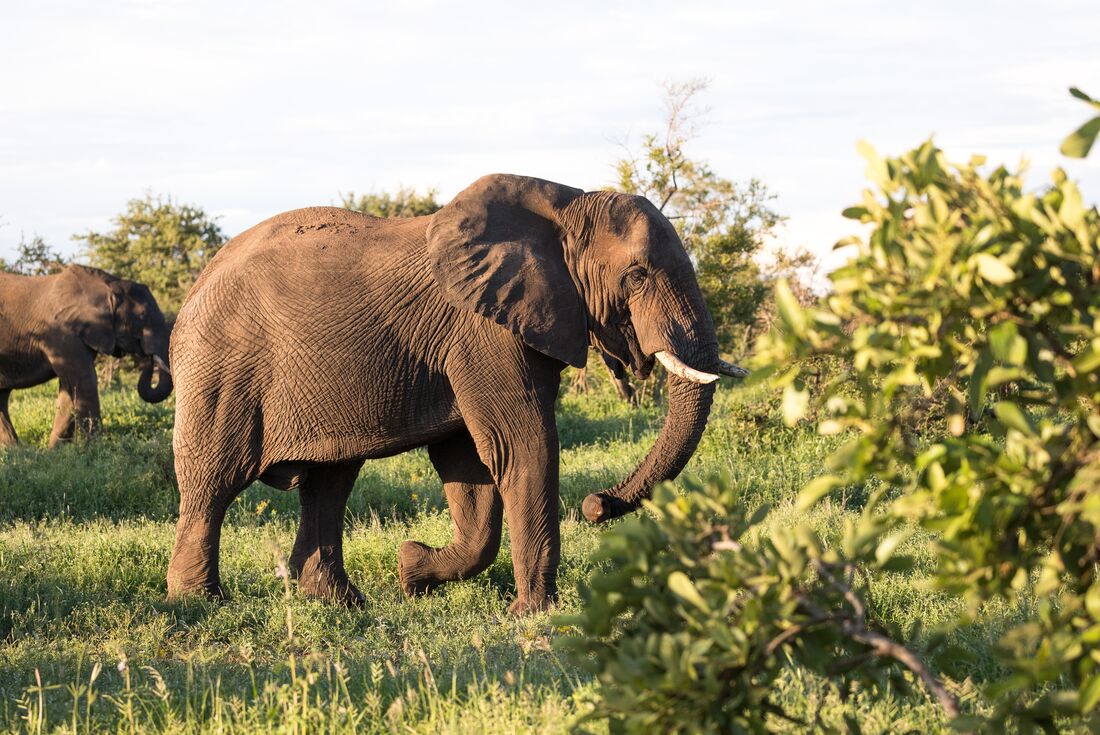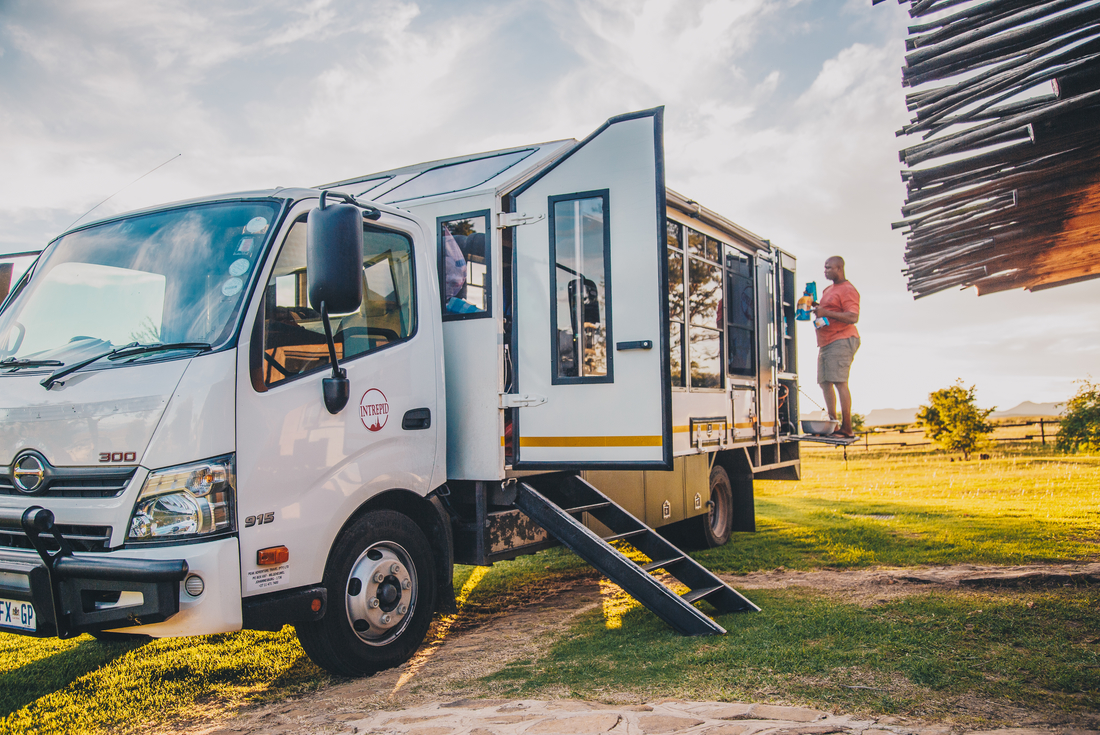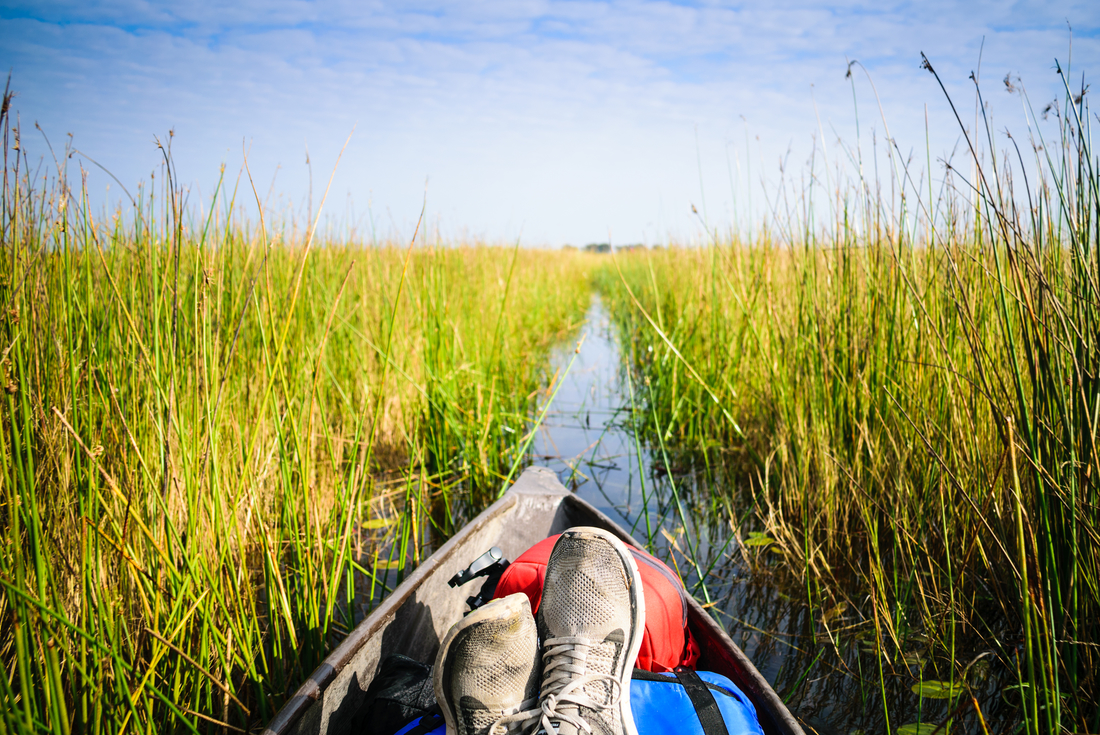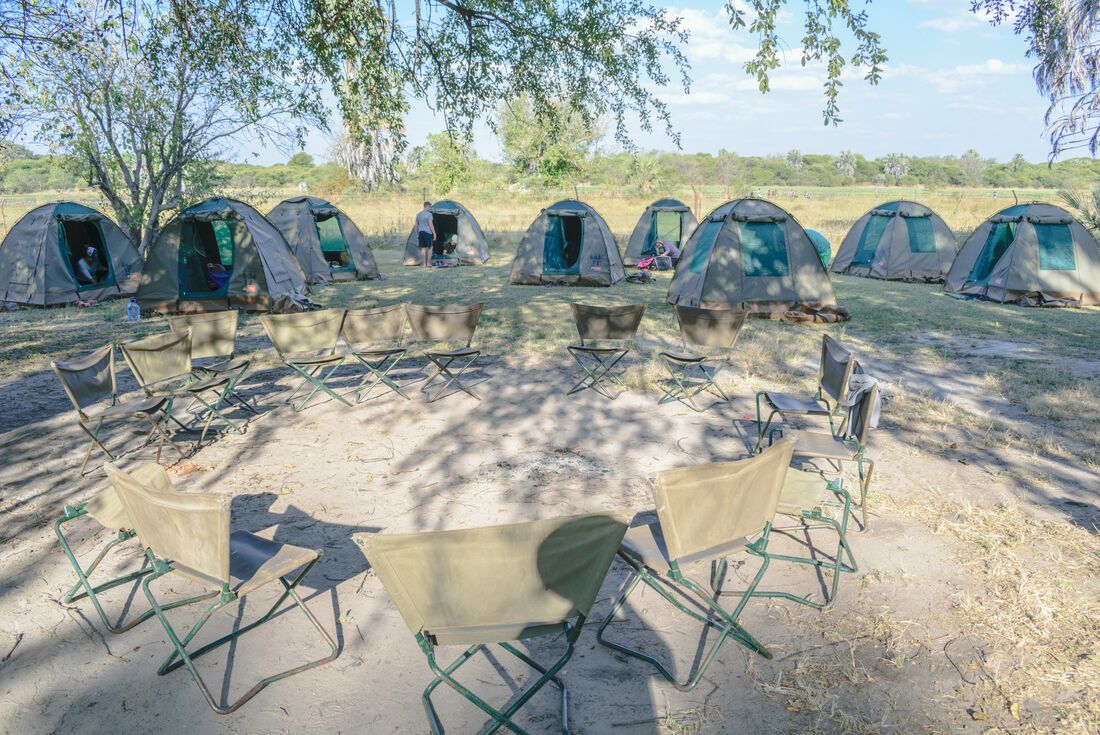- Camp under an Africa sky within Kruger National Park. You can’t get much closer to nature than that!
- Spot wildlife in Chobe National Park during a sunset river cruise. This is the time many animals – such as elephants, cheetahs and lions – come to drink so get your cameras ready!
- Experience untouched wilderness of Botswana's Okavango Delta by staying on a remote island bush camp. At night, the sounds of the African bush are the only things you will hear.
- Visit the only place in Botswana where both the white and black Rhinoceros’ still remain: the Khama Rhino Sanctuary.
- Cycle through the colourful streets of Soweto with a local and hear firsthand about the townships’ rough but inspired history.
- On this trip you will be accompanied by 3 crew members - Group Leader, Driver and a cook. Your crew are responsible for setting up camp and preparing your meals so you can take extra time to relax at the end of your day.
- Camping beds/stretchers, sleeping bags, blankets and pillows are provided for camping nights to provide an extra level of comfort.
04 Jul 2023
Experience Southern Africa
UBSCC
Validity: 01 Jan 2023 to 31 Dec 2023
Visit Southern Africa and travel from Johannesburg, through the Kruger National Park, to Victoria Falls and the Khama Rhino Sanctuary before returning to South Africa. Here's a chance to witness golden sunsets, camp in remote wilderness, safari through African plains and cruise rivers filled with iconic wildlife. Journey through South Africa, Botswana and Zimbabwe and be amazed by powerful waterfalls, enchanted by encounters with endangered species and inspired by the resolve of communities emerging from darker times. Experience Southern Africa and walk away with renewed hope, inspiration and a heart full of memories.
Original
Overland,Wildlife
Overland vehicle,Boat,Mokoro,Bicycle,Open Safari Vehicle
3
The step up into the overland truck, while not overly high, can become tiring. You need to judge yourself to be physically fit enough to haul yourself up and down at least 8-10 times a day.
Holiday Inn Rosebank
The Zone Phase 2, 187 Oxford Rd
Johannesburg
Johannesburg
2196
SOUTH AFRICA
The Holiday Inn Rosebank is a comfortable modern hotel conveniently located just a short walk from the Rosebank Train Station and Zone Shopping Centre. The hotel facilities include an outdoor pool, a well-equipped gym and nearby golfing facilities. Guest rooms are fully air conditioned, include a TV with satellite channels, ensuite, tea and coffee maker and free WiFi. The Holiday Inn Rosebank is located 25kms from Johannesburg's O. R. Tambo International Airport.
We recommend that if this is your first time to Johannesburg or if you are travelling alone, that you pre book an arrival transfer through. This can be done through your bookings consultant once you provide your flight details. There are two airports in Johannesburg; Lanseria and OR Tambo International. If you are taking a domestic flight to Johannesburg, please make sure to check your arrival airport and advise your booking agent. If you have pre-booked a transfer, your driver will be waiting for you at the Information Counter in your respective arrival terminal (domestic/international). There are often large crowds here so please look carefully for your transfer representative who will be holding an Intrepid sign board. Please do not agree to travel with individuals that claim to be your driver and do not represent “Page Corporate Transfer Services”. If you are unable to find your driver you can call Page Corporate Transfer Services Office +27 84 400 8896 at any time of the day. If your flight has been delayed we recommend to contact our local emergency number to inform them of your arrival on +27 82 822 9407. If your cell phone is not on roaming you may prefer to purchase a pre-paid sim card at the OR Tambo Arrivals Hall. Some reliable providers in South Africa are MTN, Vodacom and Cell-C. The driver will wait for two hours after your scheduled international arrival time. They will wait one hour after a Domestic arrival. If you are delayed beyond one hour after your scheduled arrival time and you have not been able to inform the transfer provider, please make your own way to the hotel. If your driver does not have your transfer on record, please present a voucher that proves your transfer booking. Our airport representative will make arrangements accordingly. Metered official Airport Taxis are also available. The cost to the hotel will be approximately ZAR400-650 which is payable to the driver. The taxi rank is located just outside the arrivals area. Please note that the journey can take anywhere from 30 minutes to 1 hour, depending on time of day and traffic. If you'd prefer to make your own way from the Airport to our hotel in Johannesburg, the Gautrain is a fast and inexpensive option. Please note that the train only operates between 05:30am and 20:30pm daily. The train journey from O.R Tambo International Airport to Sandton takes 15 minutes. From Sandton train station you will need to catch another train just one stop to Rosebank Station. A one-way fare costs approximately 202ZAR. During Peak hours the trains depart every 12minutes (05:30-08:30 & 16:00-19:00).
Vhavenda Hills B&B
11749 Mampuru Street, Orlando West Extension
Soweto
Johannesburg
SOUTH AFRICA
Located in the Orlando West suburb of Soweto - a vibrant area with numerous restaurants, bars and museums and historic sites nearby.
If you have pre-booked a departure transfer, please inform your leader and they will notify you of your departure transfer time. For international flights your transfer driver will be at reception 3.5 hours prior to the flight departure, while for domestic flights the driver will be there 2.5 hours prior to departure. If you are making your own way to the airport the hotel will be able to help book you an airport shuttle or taxi. Please ask at reception.
1. A single supplement is available if you’d prefer not to share a room on this trip. The single supplement applies to all nights of your trip and is subject to availability. Please speak to your booking agent for further information. 2. This is a combination trip made up of two shorter trips. This means the composition of your group may change in Victoria Falls as some group members leave and new ones join you. 3. This trip includes a mixture camping and other accommodation. While camping, tents, sleeping mats and sleeping bags will be provided and set up for you by our crew. 4. This trip finishes in Soweto on Day 16 after our cycle adventure. Please don't book any international flights until after 8 pm this evening. 5.On occasion, especially during the peak months of May to September and December we are not able to secure campsites within the Kruger National Park. In this instance we will camp at a backpackers outside the park. 6. BORDER CROSSINGS ON THIS TRIP: Exit South Africa - Groblers Bridge Enter Botswana - Martin's Drift Exit Botswana - Kazangula Road Enter Zimbabwe - Kazangula Road Exit Zimbabwe - Kazangula Road Enter Botswana - Kazangula Road Exit Botswana - Martin's Drift Enter South Africa - Groblers Bridge 7. Our operator has advised that customers with the J&J vaccine and no booster may have difficulty crossing the border into Botswana (and potentially Zimbabwe) without a negative test result. This information conflicts with various government travel advice websites. We recommend you check with your local consulate before travel to ensure you have the most up to date information. 8. Border crossing delays in the region have been sporadic and difficult to predict as travel rebounds. What takes an hour one day may take four hours the next. This may affect the order of activities in the itinerary. We understand this uncertainty can be frustrating, and we strongly recommend packing a bit of patience and flexibility.
On this trip you will be accompanied by 3 crew members - Group Leader, Driver and a camp assistant. Your Intrepid Group Leader’s role involves organizing the overall operation and smooth-running of the trip and managing trip logistics. Your Group Leader will work towards making the trip as safe and enjoyable as possible for all travelers. Intrepid trips are built around the co–operation and participation of all the group members under the supervision of the group leader. While not being guides in the traditional sense you can expect them to have a broad general knowledge of the countries visited on the trip, including historical, cultural, religious and social aspects. We also use local guides where we think more specific knowledge will add to the enjoyment of the places we are visiting, especially when tracking and identifying game - we think it's the best of both worlds. Our Group Leaders are chosen for their leadership skills and are wonderful ambassadors for our company and our beautiful continent and its people. Your Driver’s main responsibility is to get you to your destination safely; they are also responsible for the maintenance of the vehicles along the way. Your Camp Assistant is responsible for setting up camp; they also assist in preparing your meals. We endeavour to provide the services of an experienced leader and crew; however, situations may arise where your leader is new to a particular region or training other group leaders.
Many national governments provide a regularly updated advice service on safety issues involved with international travel. We recommend that you check your government's advice for their latest travel information before departure and ensure that your travel insurance covers you for all areas your itinerary covers. Please refer to our website's safety page for links to major travel advisories and updates on safety issues affecting our trip. We strongly recommend the use of a neck wallet or money belt while travelling, for the safe-keeping of your passport, air tickets, cash and other valuable items. Leave your valuable jewellery at home - you won't need it while travelling. Many of our hotels have safety deposit boxes, which is the most secure way of storing your valuables. A lock is recommended for securing your luggage. Your leader will accompany you on all included activities, however during your trip you'll have some free time to pursue your own interests, relax and take it easy or explore at your leisure. While your leader will assist you with the available options in a given location, please note that any optional activities you undertake are not part of your Intrepid itinerary, and Intrepid makes no representations about the safety of the activity or the standard of the operators running them. Please use your own good judgement when selecting an activity in your free time. Please also note that your Leader has the authority to amend or cancel any part of the trip itinerary if it's deemed necessary due to safety concerns. For more details on the type of conditions and safety standards you can expect on your trip, please refer to Intrepid's operational safety policy on our website. We recommend that you take a moment to read through this information before travelling, and would appreciate any feedback on how well it's being implemented in the field: www.intrepidtravel.com/safety-guidelines
FIRE PRECAUTIONS Please be aware that local laws governing tourism facilities in this region differ from those in your home country and not all the accommodation which we use has a fire exit, fire extinguishers or smoke alarms. BALCONIES Some hotel balconies don't meet western standards in terms of the width of the balcony fence being narrower than 10cm. TRAFFIC AND DRIVING ON THE OTHER SIDE OF THE ROAD Depending on where you come from please note that drivers in this part of the world may drive on the opposite side of the road from what you are used to. Look both ways before crossing any road. Traffic can be a little more chaotic than you might be used to at home. Be aware! SEAT BELTS Please be aware that local laws governing transportation safety may differ from those in your home country and not all the transport which we use is able to provide seat belts. PICK POCKETING & PERSONAL SAFETY While travelling there is always the risk of pick-pocketing and petty theft, particularly in the more touristy cities. We recommend that you exercise caution when walking at night and encourage you to walk in groups and only on main, well-lit thoroughfares. Be particularly vigilant on public transport. Simple measures like carrying your day pack on your front, not hanging your bag over the back of your chair or on the floor and wearing a money belt will reduce any chance that your valuables should go missing. WATER SAFETY Please take care when taking part in any activities in the ocean, river or open water, where waves and currents can be unpredictable. It's expected that anyone taking part in water activities is able to swim and have experience in open water. All swimmers should seek local advice before entering the water. TRAVEL ADVICE & TRAVEL INSURANCE We recommend that you check your government's advice in relation to the areas you will be visiting for their latest travel information before departure and ensure that your travel insurance covers you for all areas your itinerary covers.
UNFENCED CAMPSITES On some trips you will at times stay in unfenced campsites within National Parks. While this is a fantastic experience, there are a few safety rules to follow. While staying in National Parks it's important that you listen to any advice given by your leader and the park rangers regarding responsible and safe behaviour.
BILHARZIA Bilharzia is a parasitical disease which is usually spread by swimming in contaminated water. It can be assumed that the infection is present, to a greater or lesser extent, in almost all water sources, but most especially in shallow reedy waters in the vicinity of villages. Although the adult parasites do not themselves cause a great deal of harm, after about 4-6 weeks they start to lay eggs, which triggers an intense but usually ineffective immune response, the symptoms of which can include fever, cough, abdominal pain, and an itchy skin complaint known as safari itch. After a while the symptoms settle down and the patient is left with a sense of feeling tired all the time.
PASSPORT You’ll need a valid passport to travel internationally and most countries require your passport to have a minimum of 6 months validity, so remember to check the expiry date. We need your passport information to get everything ready for your trip so it’s important that the information on your booking matches your passport exactly. Please take care to provide the correct details. We recommend carrying a copy of the photo page of your passport while travelling and leaving a copy at home with family or friends. VISAS Many countries require a visa and obtaining the correct visa is your responsibility. We recommend you check your visa requirements as soon as you have booked your trip. This will ensure you have time to prepare your documents and for your visa application to be processed. Entry requirements can change and are different depending on your nationality. Please refer to your government's foreign travel advisories, the consular websites for the countries you’re travelling to and those you may transit through. Always follow visa advice from official websites; not all visa information found online may be valid. You can also head to Intrepid’s Entry & Health requirement page to get the latest information on travel documents and visa requirements, plus local government COVID-19 vaccination and quarantine policies: https://www.intrepidtravel.com/au/visa-health-requirements SOUTH AFRICA: Many countries do not need visas to visit South Africa as a tourist for up to three months. Please check with the relevant consulates as to whether a visa is required Entry Requirements – Passports: Please note that non-machine readable passports are no longer accepted by South African immigration. All visitors to South Africa must have a machine readable travel document (e-passport). Failure to present an e-passport will result in denied entry. Passengers with a valid visa issued in a non-machine readable passport will be handled on a case by case basis, but a fine will still be applicable. Entry Requirements - Yellow Fever Certificate: A valid Yellow Fever Vaccination Certificate is required for all passengers over one year of age who arrive or are transiting through South Africa, from a country or region listed by the World Health Organization as infected by yellow fever. Travellers unable to present a valid yellow fever vaccination certificate issued at least 10 days before arrival in South Africa will be refused entry. There is no option for travellers without a vaccination certificate to be vaccinated on arrival. Please note this also includes transiting through an infected country or region. NEW ZEALAND PASSPORT HOLDERS: Effective 15th August 2019, New Zealand visitors no longer require a visa for South Africa. BOTSWANA: Please check with your relevant consulates as to whether a visa is required. For passengers requiring a visa to Botswana, application forms can be downloaded from https://www.gov.bw/visa-applications/visa-application-tourism-visa as well as instructions for applying. Entry Requirements - Yellow Fever Certificate: A valid Yellow Fever Vaccination Certificate is required for all passengers over one year of age who arrive or are transiting through Botswana, from a country or region listed by the World Health Organization as infected by yellow fever. Travellers unable to present a valid yellow fever vaccination certificate issued at least 10 days before arrival will be refused entry. There is no option for travellers without a vaccination certificate to be vaccinated on arrival. Please note this also includes transiting through an infected country or region. Children travelling to Botswana: Please note that if you’re travelling to Botswana with a person under the age of 18 then you need to provide a certified copy of the child’s full unabridged birth certificate in order to enter the country (the one listing the child’s details and both parents’ details. - the short birth certificate which only lists the child’s details won’t be accepted). Additionally, if the child is travelling with only one parent, with neither biological parent, or is unaccompanied, then they must provide an affidavit of consent of the parent(s) that are not travelling, to prove that the trip is made with both parents' consent. Please contact your nearest Botswanan Embassy if you have further questions regarding this. ZIMBABWE: Zimbabwe visas are required by most nationalities, including from the EU, US and Australia. For most nationalities, Zimbabwe visas are available at the point of entry. If you plan to purchase your visa on arrival you will need approximately USD30/45 in cash. All nationalities should check with their nearest Zimbabwe Embassy for up to date information. For passengers from countries that require visas prior to arrival there is an E-Visa where information can be found at https://www.evisa.gov.zw/home KAZA Visa: The Kaza visa is valid for travel between Zambia and Zimbabwe. It is available at land borders at Livingstone (Zimbabwe border) and Kazungula (Botswana border). The cost of the visa is USD$50 and is valid for 30 days as long as you stay within Zimbabwe and Zambia. BORDER CROSSINGS ON THIS TRIP: Exit South Africa - Groblers Bridge (Day 5) Enter Botswana - Martin's Drift Exit Botswana - Kazangula Road (Day 7) Enter Zimbabwe - Kazangula Road Exit Zimbabwe - Kazangula Road (Day 9) Enter Botswana - Kazangula Road Exit Botswana - Martin's Drift (Day 15) Enter South Africa - Groblers Bridge
Camp under an Africa sky within Kruger National Park. You can’t get much closer to nature than that!
Spot wildlife in Chobe National Park during a sunset river cruise. This is the time many animals – such as elephants, cheetahs and lions – come to drink so get your cameras ready!
Experience untouched wilderness of Botswana's Okavango Delta by staying on a remote island bush camp. At night, the sounds of the African bush are the only things you will hear.
Visit the only place in Botswana where both the white and black Rhinoceros’ still remain: the Khama Rhino Sanctuary.
Cycle through the colourful streets of Soweto with a local and hear firsthand about the townships’ rough but inspired history.
On this trip you will be accompanied by 3 crew members - Group Leader, Driver and a cook. Your crew are responsible for setting up camp and preparing your meals so you can take extra time to relax at the end of your day.
Camping beds/stretchers, sleeping bags, blankets and pillows are provided for camping nights to provide an extra level of comfort.
This is an overland trip. That means you’ll be travelling with a group in a purpose-built vehicle, visiting remote communities, setting up your own tent (unless you’re on an Original or Comfort style trip), occasionally roughing it in the bush with no facilities, and getting the best possible views of the ‘big five’. While the trucks don’t have air conditioning, they do have sliding windows which let in the breeze and make it even easier to take spectacular snaps of the local wildlife. The drive days can be long, but it’s as much about the journey as the destination, and half the fun is the camaraderie. For more info on this style of travel, see our Africa overland page: https://www.intrepidtravel.com/au/africa/overland Camping on a remote island in the heart of the Okavango wilderness is an experience you’ll never forget. However, there are no facilities. Dig a bush toilet and go without a shower, it's all part of the Delta experience. A cycle tour in Soweto is included on the final day of the trip. It is not an overly strenuous ride, buy Soweto is not completely flat so you should have a reasonable level of fitness. Wildlife viewing requires some sacrifice, like getting up before day break for dawn game drives. However, the lack of sleep is worth it for the exhilaration and excitement of spotting your first lion or rhino! As the early bird catches the worm, the early camper sights the animals. There will be many early starts either to make use of the better safari time or to beat the morning traffic on long travel days.
GENERAL HEALTH All travellers need to be in good physical health in order to participate fully on this trip. When selecting your trip please make sure you have read through the itinerary carefully and assess your ability to manage and enjoy our style of travel. Please note that if in the opinion of our group leader or local guide any traveller is unable to complete the itinerary without undue risk to themselves and/or the rest of the group, we reserve the right to exclude them from all or part of a trip without refund. You should consult your doctor for up-to-date medical travel information or for any necessary vaccinations before departure. We recommend that you carry a first aid kit as well as any personal medical requirements in their original packaging as they may not easily be obtained while travelling. COVID-19 The safety and wellbeing of our travellers, leaders, crew, staff, and suppliers continues to remain our highest priority as we travel. You can read more about how we will keep you safe on our trips, including our COVID-19 Health & Safety Guidelines here: https://www.intrepidtravel.com/safe-travels VACCINATION POLICY From 1 January 2023, Intrepid will no longer require travellers to provide proof of vaccination against COVID-19 for this trip. However, we continue to strongly recommend that all travellers get vaccinated to protect themselves and others. Specific proof of testing or vaccination may still be required by your destination or airline. Please ensure you check travel and entry requirements carefully. For more information, including a detailed FAQ about this policy, please visit https://www.intrepidtravel.com/covid19. HEALTH SCREENING If you are unwell prior to travelling, please stay at home and contact us to make alternative arrangements. From 1 January 2023, Intrepid will no longer require travellers to complete a self-screening health form at the group meeting for this trip. If you are displaying any COVID-19 symptoms or have any health concerns during the trip, we will follow the advice of local health authorities to determine whether medical assistance, isolation or further action is required. Travellers who test positive while taking part in an Intrepid trip will need to leave the group for a minimum of five days and may only rejoin the group if presenting as asymptomatic – our team will assist them in arranging a place to self-isolate and any onward journey. It's quite possible that the destination country may have different or more strict protocols than your home country regarding COVID-19. This may include hotel or hospital quarantine or quarantine for the group. Please check your government's travel advice or contact the closest embassies to find out the details. We ask all travellers to continue to monitor their health throughout their travels and report any relevant symptoms to their tour leader. YELLOW FEVER: A valid international certificate of vaccination against Yellow Fever is required in many countries if you are arriving from a country with risk of yellow fever (eg. Kenya). You may need to present this on arrival at the airport or border crossing. Some countries will refuse entry if you are unable to present your certificate. It's also quite common for your home country to request a Yellow Fever certificate on your arrival back home. It is your responsibility to check with your doctor well in advance of leaving home about the Yellow Fever requirements for the countries you'll be visiting. TYPHOID: It is recommended that if you are travelling to Harare you make sure that your Typhoid vaccinations are up to date. There has been an outbreak of typhoid in parts of Harare, with over 1500 cases reported since October 2011. For more information speak to your doctor and see the World Health Organization (WHO) website. DRINKING WATER As a rule we recommend you don't drink tap water, even in hotels, as it may contain much higher levels of different minerals than the water you are used to at home. For local people this is not a problem as their bodies are used to this and can cope, but for visitors drinking the tap water can result in illness. Generally this isn't serious, an upset stomach being the only symptom, but it's enough to spoil a day or two of your holiday. Many hotels and lodges provide safe drinking water, while bottled water is another alternative. Water consumption should be about two litres a day. Rehydration salts, motion sickness tablets, and diarrhoea blockers are available from many pharmacies.
Your crew will come up with meal ideas and quantities needed for large groups. If you have any dietary requirements please tell us at the time of booking, and also remind your crew at your welcome meeting. A typical camp breakfast might be toast with spreads, cereal, something hot such as eggs or pancakes, as well as tea and coffee. Lunch is almost always a sandwich with healthy salad and assorted fillings, sometimes with fruit to follow. There may be a chance on occasion to buy your lunch. Dinner might be a BBQ, rice dish or pasta dish and there is always the chance to try some African food such as ugali and stew. On the more remote sections of your trip, your food and diet will be dependent on what is available locally as well as tinned and dry ingredients. One thing is sure - you definitely won't go hungry or lose weight on your safari! When you aren't camping you will have the freedom to decide where, what and with whom you eat.
When it comes to money matters on the trip, every traveller is a little different. You know your spending habits better than we do, so please budget a sensible amount for things like meals not included, drinks, shopping, optional activities, tipping and laundry. It’s always better to bring a little more than you think you’ll need. Also make sure you’ve read your trip details thoroughly so you know what’s included in the trip price and what isn’t. This should make budgeting a little easier. You’ll find this info in the Inclusions section of your Essential Trip Information (that’s this document). Please note: all recommendations for additional costs, tipping etc. are in USD. You will need to convert these into the relevant local currency. MEALS NOT INCLUDED Breakfast, dinner and most lunches are included while camping on our overland safaris. For lunches not included, a budget of USD10 to USD15 per meal will be more than sufficient. For dinners not included, your leader will normally recommend options and restaurants where you can safely try the local specialties of the region. Expect meals to cost between USD12 to USD25 for a main. These are indicative prices only. If you are in a tight budget and are happy to try local food, you can eat cheaper than this. TIPPING Gratuities aren’t compulsory on your trip, but they can make a big difference to locals employed in the tourism industry. If you are happy with the services provided, a tip is an appropriate way to thank them. While it may not be customary to you, it is of great significance to the people who will take care of you during your travels, inspires excellent service, and is an entrenched feature of the tourism industry across many destinations. Usually the equivalent of around USD7 to USD14 per person, per day to cover all tips is fine. TIPPING GUIDE To give you a bit of guidance, we’ve put together the following tipping notes. These are just suggestions, based on feedback from past travellers and our staff on the ground. - Your Crew (including Leaders, Drivers and Cooks): You may also consider tipping your crew for outstanding service throughout your trip. The amount is entirely a personal preference; however as a guideline USD2 to USD4 per staff member, per day can be used. Of course you are free to tip more or less as you see fit, depending on your perception of service quality and the length of your trip. It is best to then divide these amounts into separate envelopes for each crew member. Remember, a tip is not compulsory and should only be given when you receive excellent service. - Local guides: Throughout your trip you may at times have a local guide in addition to your leader. We suggest around USD2 per person, per day for local guides. - Basic restaurants: When checking the bill, if there’s an addition of 10% service charge, there’s no requirement for tipping. Otherwise, 10% of the total bill amount is appropriate. TIPPING KITTY Over the years we have found that many of our travellers find the need for tipping local guides and operators to be both tiresome and embarrassing, especially if they don't have the correct small change. To overcome this, your leader might raise the idea of a group tipping kitty. At your group meeting, your tour leader may discuss the idea of running this kitty, whereby everybody contributes an equal amount and then your tour leader pays the tips as you go. The leader will keep a running record of all monies spent (except restaurant tips). The record can be checked at any time and any money remaining at the end of the tour returned to group members. This kitty does not include tips for your leader and crew. EMERGENCY FUNDS We try to plan for every eventuality, but there are still some things beyond our control. Please make sure you bring an extra USD500 for emergencies (e.g. natural disasters or civil unrest). Sometimes these things necessitate last minute changes to our itineraries, and we can’t guarantee there won’t be some extra costs involved. CREDIT CARDS, ATMS AND MONEY EXCHANGE: Credit cards are generally accepted in tourist shops and some restaurants across Africa. Visa and Mastercard are generally preferred over American Express, Diners, etc. Smaller venues take cash only. Foreign currency is easily changed at exchange bureaus and they generally offer the best rates. With ATMs being increasingly available in the many major towns and cities and even some campsites, credit or debit cards are a convenient way to access money. Be aware that your withdrawing limit may vary from country to country (regardless of your withdrawing limit in your home country) and it can be as low as the equivalent to USD100 per day. Throughout Africa, cards with the Visa logo are most readily recognised, although MasterCard is also accepted in most places. A charge is made for each international transaction - please check with your bank how much this fee will be. Check with your bank before leaving home that your card can be used as a debit card in Africa. You may also want to notify your bank that you are visiting Africa as it's not unknown for banks to freeze cards which show sudden transactions in other countries. If you're on a multi-country tour, your tour leader will be able to give you an approximate idea of how much money you may need for your stay in each country. PLEASE NOTE: Many businesses and banks in Africa, especially East Africa, do not accept US dollar notes older than 2006. If you are bringing USD, we strongly recommend large bills in good condition, 2006 series onwards only. Any old or damaged notes may not be accepted. ACCESSING CASH IN ZIMBABWE: Zimbabwe has now reverted to their own currency, Zimbabwe dollars. However accessing this currency can be difficult and exchanging money at banks encounters long queues. Optional activities can still and must be paid in USD, while visas on arrival can also be paid in USD. On ground costs such as lunches and market purchases must be paid in Zimbabwe dollars or by using a credit card. You should plan your travel expenses in advance and bring sufficient USD into the country to support your stay. Your leader or local representative will be on hand to advise on this matter should you need it. COMMISSIONS Unfortunately, commissions in exchange for recommending particular shops or restaurants are an ingrained part of the tourism industry. Rather than turning a blind eye, we’ve tried to legitimise the practise with a centralised fund. Moneys are collected from recommended and fully vetted suppliers and funnelled back into our business. This keeps the trip cost low (for us and for you) and makes sure you only get the best experiences. If you’re unhappy with any places your leader recommends, or feel the quality of the trip is being compromised in any way, please let us know in your feedback.
We recommend you pack as lightly as possible and make sure that you are able to carry and lift your own luggage, and walk with it for short distances. Most travellers carry their luggage in a backpack, although an overnight bag with a shoulder strap would suffice if you travel lightly. Smaller bags or backpacks with wheels are convenient although we recommend your bag has carry straps. You'll also need a day pack/bag to carry water and a camera etc for day/overnight trips. Below are some ideas and helpful tips on what you specifically need for this trip. ESSENTIALS: - Closed in shoes. As this trip includes camping and/or bush walking we highly recommend that you take a pair of comfortable, closed-in walking shoes. Closed-in shoes will help to protect your feet from cuts and scratches when walking through bush/grass-lands, and will also act as a barrier protection in rare cases against bites or stings from dangerous animals in this environment. - Lightweight clothing. You will need to bring a mixture of lightweight clothing, some warm items for the evenings, and long shirts and pants for protection against mosquitoes in the malaria areas. Clothes should be easy to wash and dry. Some people like to take jeans for evenings out but they can be tough to dry and should not be used for trekking. Avoid nylon and other synthetics, which can be very uncomfortable in hot weather. Ex-military or military style clothing and equipment is NOT recommended. - Waterproof/windproof jacket is a good idea for wet days, and early morning or evening game activities when it can be cool. - Warm fleece and beanie for morning and evening game drives. - Sun protection - hat, sunscreen, sunglasses - Towel (or travel towel) RECOMMENDED: - A simple plastic bag/waterproof toiletry bag (that can hang on a nail on the back of a door) will be useful to keep your clothes dry inside basic camp shower structures. - A good quality, high-beam headlamp or torch for around the campsite at night. Some campsites have limited lighting and are powered by generators that switch off at a certain time. Although the trucks do carry lamps for meal times it’s a good idea to bring a headlamp to navigate the campsites and in particular going to the bathroom in the middle of the night. - Personal medical kit. Your guide will carry a large kit but we recommend you carry items such as mild pain killers, electrolytes, anti-diarrhoeal, antibacterial gel, wet wipes, bandaids/plasters etc. - Insect repellent. - Water bottle. We recommend at least a 1.5litre capacity. The sale of bottled water contributes to an enormous environmental problem around the world. In addition to the water in bottles, the production of a 1 litre plastic bottle takes 2 litres of water and 200ml of oil. A large proportion end up in limited landfill or discarded in waterways and natural environments. - Camera with spare battery or power bank. OPTIONAL: - Sleeping bag liner. Great for extra warmth in the colder months or just on their own in the warmer months. - Thermarest. While we provide a basic camping mattress for the camping nights, some travellers find they like the extra comfort of a double layer. - Ear plugs to guard against a snoring tent-mate - A good book, a journal, or an mp3 player for the long drives. BEDDING: Sleeping bags, blankets and pillows are provided for the camping nights. LUGGAGE LIMIT: The weight limit for luggage on all trucks is a strict maximum of 20kg. Your main luggage will be stored in a compartment at the back of the truck. Traditional, framed suitcases are not recommended as they are large and can damage other travellers belongings while on the road. Backpacks or duffel bags are an ideal choice. VALUABLES: Please try to avoid bringing unnecessary valuables, and use your hotel safe and the safe on the overland truck to store the bulk of your money, passport, and airline tickets. It’s also a good idea to purchase a money belt or pouch that is easily hidden. We strongly recommend that you photocopy all important documents e.g. air tickets, passport, vaccination certificate, etc. and keep the copies separate from the originals. While not valid, a photocopy makes it very much easier to obtain replacements if necessary. POWER: Our overland vehicles are equipped with multiple power boards which may be used at the crew’s discretion, however, do bear in mind that only a minimal number of items can be charged at a time and will not be allowed if there is a risk of running the vehicle’s batteries low. Some campsites have electricity and charging of devices is advised before checking out the following day. We also recommend power banks and multi country power converters. CONSERVATIVE DRESS FOR WOMEN: In many parts of Africa women travelers should dress modestly as there is a wide range of cultural differences. Wear skirts or shorts that reach just above the knee and tops that cover shoulders at a minimum.
PLASTIC BAG BANS ACROSS AFRICA While Namibia holds people liable to a fine of N$500 or imprisonment for entering Game Parks with a plastic bag, Botswana has announced a countrywide ban on plastic bags to come into effect on 1 November 2018. The ban will make the importing, trading and commercial use of plastic bags a criminal offence. Exceptions will be made for plastics that are essential for health and hygiene. With these announcements, Botswana and Namibia join other African countries such as Tanzania, Kenya, Ethiopia, Uganda, Tunisia, Morocco, Rwanda, Uganda, Somalia and Eritrea that have banned plastic bags. South Africa imposed a levy on plastic bags in 2004 but they have not yet been banned. Many countries are strictly enforcing this and have been searching luggage at border points. Camping stores are good for obtaining waterproof reusable bags, for dirty laundry etc, prior to departure.
Yes it is Africa, however the winter months can be very cold. Please bring warm winter clothing such as wool pullover and a jacket. Also consider thermals, gloves and a woolly hat. WEATHER IN BOTSWANA The Okavango Delta, Moremi and Chobe are Botswana's most popular parks. The best time to visit them is from May to September, during the dry season and winter, resulting in more moderate temperatures. There is also less vegetation and animals tend to concentrate around waterholes and rivers, making wildlife easier to spot. The Okavango Delta is also in full flood. The skies are clear, rain is rare and there are fewer mosquitoes. It does get cold at night and in the mornings. Packing warm winter clothing during June, July and August for the cold morning game drives is advisable. In September and October temperatures climb again, drying the landscapes and concentrating the game even more. However, October can feel very hot, with maximum temperatures sometimes approaching 40°C. November is difficult to predict, as it can sometimes be a continuation of October's heat, whilst sometimes it's cooled by the first rains; it's always an interesting month. November to April is known the wet Season and Summer. Although wildlife is easier to spot in the dry season, you'll still see plenty, including newborn animals and migratory birds. Except for January and February, rains are mostly short afternoon showers and seldom have a negative impact on your trip. The water from the Angolan Highlands starts to push into the Delta in the late summer and early autumn months with winter offering the highest levels. The Okavango water levels start receding towards the end of the winter months and into spring, with the summer months offering up the lowest levels. Please be aware that this can affect some water activities such as mokoro or boat trips.
We like to think our Intrepid travellers are all connected by a love of adventure and passion for seeing the world in a different way. We've laid down a few non-negotiable rules to ensure everyone feels connected, comfortable and safe on our trips. We ask that you respect your fellow travellers, group leader, and local people and places we visit in all circumstances. We don't tolerate any forms of violence and expect that you follow the local laws, customs and regulations in any destination we travel to. Any behaviour contrary to the above, including any behaviour that prevents our staff from performing their duty of care or continuing the itinerary as planned, may result in travellers being removed from the trip. If you consume alcohol while travelling, we encourage responsible drinking and expect you to abide by local alcohol laws. To ensure the well-being of everyone on the trip, all decisions made by group leaders and ground staff are final. Romantic relationships between travellers and group leaders are not permitted while on trip. By travelling with us, you agree to comply with these rules and the laws and customs of all countries visited. If something is concerning you during your travels with us, please speak to your group leader or local guide immediately. Alternatively, contact us on the emergency contact number detailed in your Essential Trip Information’s Problems and Emergency Contact section.
Can’t stop thinking about your adventure? Tell us all about it! We read each piece of feedback carefully and use it to make improvements for travellers like you. Share your experience with us at: http://www.intrepidtravel.com/feedback/
While we always endeavour to provide the best possible holiday experience, due to the nature of travel and the areas we visit sometimes things can and do go wrong. Should any issue occur while you are on your trip, it is imperative that you discuss this with your group leader or our local representative straight away so that they can do their best to rectify the problem and save any potential negative impact on the rest of your trip. We recognise that there may be times when your group leader/local partner may not be able to resolve a situation to your satisfaction - if this is the case, please ask the leader to speak to their direct manager. You may also choose to provide details in your online feedback, which we ask you to complete within 30 days of the end of your trip. Please do be aware that it is very difficult for us to provide any practical help after the trip is completed, so informing us while still travelling will give us the opportunity to resolve the issue in real-time. For general contact details please use the following page: http://www.intrepidtravel.com/ourtrips/contact/ In case of a genuine crisis or emergency, you can reach our local office on the number below: Intrepid's local Operator: +27828229407
Our Responsible Travel Policy outlines our commitment to preserving the environment, supporting local communities, protecting the vulnerable, and giving back to the places we travel. All our trip leaders, suppliers, and staff are trained on these principles and are core to us delivering sustainable, experience-rich travel. Explore the different parts of our Responsible Travel Policy by visiting: https://www.intrepidtravel.com/responsible-travel Love wildlife? Us too. We believe nature should be protected, respected and never exploited for our entertainment. That’s why we design all of our wildlife trips and experiences to meet the standards set out in our animal welfare guidelines (https://www.intrepidtravel.com/en/animal-welfare), created in collaboration with World Animal Protection. This ensures that the unforgettable animal encounters our travellers rave about are conducted responsibly, with the utmost respect for all creatures. What does that mean for you? Well, we never ride, feed or handle wild animals for a start. Take a closer look at our animal welfare policy (https://www.intrepidtravel.com/sites/intrepid/files/Intrepid_Travel_Animal_Welfare_Policy.pdf) to learn more about how we champion responsible, cruelty-free experiences on our trips, and see how you can help make a difference when you travel with our animal-friendly travel tips (https://www.intrepidtravel.com/en/how-be-better-traveller-wildlife).
We created our not-for-profit, the Intrepid Foundation because you – our travellers – told us you wanted to make an even greater impact in the communities you visit. The Foundation works by teaming up with partners around the world so that together we can deliver greater positive impact at scale. Partners are identified by our local staff who live and work in our destinations. They harness their powerful community connections to determine the issues that matter most and select local partners who can deliver real solutions. Since 2002, the Intrepid Foundation has raised more than 12.8 million dollars and supported more than 130 communities worldwide. Now, with almost 40 partners all over the world, your donations are helping to restore forests in Kenya, empower women in Honduras and promote elephant welfare in Laos, to name just a few. By simply being on this trip, Intrepid Travel will make a donation to the Intrepid Foundation on your behalf. If you choose to donate too, 100% of your donations will go directly to our partners on the ground – where they’re needed most. For more information about the Intrepid Foundation, please ask your leader or visit our website: http://www.theintrepidfoundation.org/ This trip directly supports Victoria Falls Wildlife Trust, who work with local communities to promote wildlife conservation in Southern Africa. Communities living on the border of Victoria Falls National Park rely on subsistence farming of crops and livestock, usually producing no more than they need. When wildlife – the same creatures travellers would encounter on a safari – run into their land, it can have dire consequences: for the animals, the crops and the people. Donations help employ a team of Community Guardians who collaborate with locals to find sustainable solutions to human-wildlife conflict and conservation. To find out more or make a donation, visit: www.theintrepidfoundation.org/t/victoria-falls-wildlife-trust
This trip includes a mixture camping, hotels, lodges and permanent tents. While camping, tents, sleeping mats and sleeping bags will be provided and the crew & camp hands will set these up for you. There may be the occasional night stop, when we stay in the grounds of a hotel or at a campsite which may also have rooms/cabins available. In this case there may be a choice of camping or upgrading to a room. Rooms cost between approximately USD60-120 per room per night for a twin room and cannot be pre-booked.
Our trucks are purpose-built, self contained safari vehicles. Our fleet of vehicles varies depending on your group size, trip route and style. In Southern Africa some departures may use vans and luggage trailers subject to group size and vehicle availability. It is also important to note that our overland vehicles are not air-conditioned, but all vehicles have windows that can be opened to allow for fresh air. There are many early starts with long hours spent driving on rough roads on all African itineraries. While most people love the chance to watch the changing landscape and daily village life, feedback shows that long periods of inactivity does not appeal to all clients. We provide the approximate distance covered each day and how many hours this normally takes to drive so that you can choose the safari experience that is right for you. African conditions are extremely tough on vehicles. While we fastidiously maintain our vehicles at our workshops, you should not expect Africa to be your traditional touring experience. While it's certainly our aim to avoid them, it's important that you set off on your trip knowing that the occasional breakdown can happen and are best treated as part of the African adventure. Due to wet weather there may be times when we have to take an alternative route which will mean longer travel times.
Travel insurance is compulsory on all our trips for those travelling internationally. We require that at a minimum you are covered for medical expenses including emergency repatriation. If you are travelling within your home country or region please confirm before travel that you are entitled to access the public medical system easily should an accident occur. We strongly recommend all travellers have a policy that also covers personal liability, cancellation, curtailment and loss of luggage or personal effects. For international trips, you will not be permitted to join the group until evidence of travel insurance and the insurance company's 24-hour emergency contact number has been sighted by your leader. If you have credit card insurance your group leader will require details of the participating insurer/underwriter, the level of coverage, policy number, and emergency contact number rather than the bank's name and your credit card details. Please contact your bank for these details prior to arriving in-country. For travellers who reside within the European Union, Switzerland or USA the requirement to purchase travel insurance cannot be compulsory. However the purchase of travel insurance is still highly recommended, and travellers from these regions who decline travel insurance when travelling outside of their home region must sign a Travel Insurance Waiver Form at the Group Meeting, recognizing personal responsibility for emergency medical and repatriation costs should they arise. For assistance with travel insurance or other services, please visit the link below: https://www.intrepidtravel.com/booking-resources/our-services
As you travel on a group trip you will be exposed to all the pleasures and maybe some of the frustrations of travelling in a group. Your fellow travellers will probably come from all corners of the world and likely a range of age groups too. We ask you to be understanding of the various needs and preferences of your group - patience with your fellow travellers is sometimes required for the benefit of everyone's travel experience. Remember too that you have responsibilities to the group. If you are requested to be at a place at a certain time, ensure that you don't keep the rest of the group waiting. We have found time and time again that the very best trips we operate are those where the dynamics within the group work well - this takes just a little effort on your part. Due to privacy reasons, we are unable to provide you with contact details and any personal information about your fellow travellers booked on your trip prior to departure. SOLO TRAVELLERS The beauty of our style of travel is that it caters to travellers who are travelling solo and who want to meet and share experiences with like-minded people. On our trips rooming is organised on a twin-share basis. We pair up solo travellers with another traveller of the same gender as per the gender marker on each of their passports. As a responsible tour operator, we strive to create a safe and inclusive environment for everyone. In the case that your gender identity differs from what is indicated on your passport, please contact us so that we can discuss rooming options with you. We also have an optional single supplement available on most trips for travellers who prefer to have their own room. Please note that this only applies to accommodation during the tour. Pre-trip and post-trip accommodation booked through us will be on a single room basis. On a small selection of itineraries some accommodations are booked on an open gender, multi-share basis (for example on a felucca in Egypt or an overnight train in Vietnam). In those instances it will clearly be stated in our Essential Trip Information prior to booking and travelling.
ITINERARY CHANGES Our itineraries are updated regularly throughout the year based on customer feedback and to reflect the current situation in each destination. The information included in this Essential Trip Information may therefore differ from when you first booked your trip. It is important that you review this information prior to travel so that you have the latest updates. Due to weather, local conditions, transport schedules, public holidays, or other factors, further changes may be necessary to your itinerary once in-country. The order and timing of included activities in each location may also vary seasonally to ensure our travellers have the best experience. Your tour leader will keep you up to date with any such changes once on tour. OPTIONAL ACTIVITIES A selection of optional activities that have been popular with past travellers are listed in the day-to-day itinerary. This isn't an exhaustive list and should be used as a guide only for some of what might be available. Prices are approximate, are for entrance only, and don’t include transport to and from the sites or local guides unless indicated. All activities are subject to availability, and maybe on a join-in basis. It may not be possible to do all the activities listed in the time available at each destination, so some pre-planning for what you are most interested in is advised. When it's recommended that travellers pre-book these activities, look for a note in the Special Information section of the day-to-day itinerary. For most, they can either be organised independently on the day, or let your leader know you are interested in the Group Meeting and they can assist. Where activities are considered medium or high risk, we work with operators whose safety and credentials we have sighted and assessed. Although it is possible that you may find the same activity cheaper with another operator on the ground, we cannot vouch for the safety or quality of that operator. Medium and high-risk activities not listed above have not been assessed by us and as such our staff and leaders are unable to assist you with organising these activities. Activities that contravene our Responsible Travel policies are also not listed. Please remember that the decision to partake in any activity not listed is at your own discretion and risk. KRUGER PARK CAMPSITES: On occasion, especially during the peak months of May to September and December we are not able to secure campsites within the Kruger National Park. In this instance we will camp at a backpackers outside the park. ROAD CONDITIONS AND INFRASTRUCTURE IN AFRICA: Roads in Africa are often in very poor condition, which makes it hard on our vehicles. Our vehicles are serviced regularly and are generally in good condition, but breakdowns can and do happen. Sometimes the going on this trip is quite tough, the distances covered fairly large and some of the roads and tracks are not exactly smooth or free from dust, but the rewards are exceptional. The travelling times indicated in our Essential Trip Information is just a rough guide and is dependent on various factors that may be outside our control, such as road conditions, weather and time spent at borders. DRIVE TIMES: The travel times listed in the day to day itinerary are a guide only. Please be aware that delays may occur and please be patient - it's all part of the experience afterall! Additionally, the travel times do not include time spent on game drives as these can vary with each departure.
Hotel (3 night),Lodge (1 night),Permanent Tented Overland Camp (2 nights),Meru Tent (1 night),Guesthouse (1 night),Camping with facilities (5 nights),Basic Camping with no facilities (2 nights)



